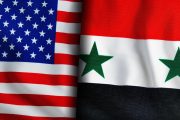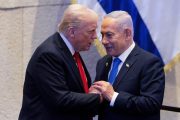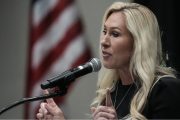In an interview with CNN’s New Day anchor Chris Cuomo broadcast on August 23, President Obama — when asked about allegations made by anti-government activists in Syria that President Bashar al-Assad’s forces had used chemical weapons in an attack said to have killed more than 1,300 people — said that officials are “right now gathering information” and that “what we’ve seen indicates that this is clearly a big event of grave concern.”
“It is very troublesome,” Obama commented.
The president did stop short of advocating intervention in Syria, however, and his language seemed more restrained than that used by former President Bush when advocating the invasion of Iraq because Saddam Hussein was also alleged to have used chemical weapons. (For example, during a radio address on February 8, 2003, Bush said: “We have sources that tell us that Saddam Hussein recently authorized Iraqi field commanders to use chemical weapons — the very weapons the dictator tells us he does not have.” And during an address to the nation on March 17, 2003, Bush said: “We cannot live under the threat of blackmail. The terrorist threat to America and the world will be diminished the moment that Saddam Hussein is disarmed.”)
Obama said during the interview that the ability of the United States to solve “a sectarian, complex problem was sometimes overstated,” in reference to calls by France and the anti-Assad Syrian opponents for international intervention.
“We have to think through strategically what’s going to be in our long-term national interests,” said the president, calling attention to the casualties from the U.S. war in Iraq and Afghanistan who are still hospitalized.
“Every time I go to Walter Reed [Hospital] and visit wounded troops, and every time I sign a letter for a casualty of that war, I’m reminded that there are costs and we have to take those into account as we try to work within an international framework to do everything we can to see Assad ousted.”
President Obama’s Deputy Press Secretary Josh Earnest posted a statement on the White House website on August 21 that condemned chemical weapons but carefully avoided making unproven charges against the Assad regime. The statement read, in part:
The United States is deeply concerned by reports that hundreds of Syrian civilians have been killed in an attack by Syrian government forces, including by the use of chemical weapons, near Damascus earlier today. We are working urgently to gather additional information.
The United States strongly condemns any and all use of chemical weapons. Those responsible for the use of chemical weapons must be held accountable. Today, we are formally requesting that the United Nations urgently investigate this new allegation.
As was the case in Iraq, the U.S. government has routinely called on the United Nations to intervene (or to authorize U.S. intervention) in the affairs of other nations. On December 19, 2002, as the United States geared up for the invasion of Iraq, which came about the following March, U.S. Secretary of State Colin Powell stated that Iraq was in “material breach” of Security Council Resolution 1441. On February 5, 2003, Powell appeared before the UN Security Council to make an urgent case for war with Iraq, stating: We know that Saddam Hussein is determined to keep his weapons of mass destruction; he’s determined to make more…. The United States will not and cannot run that risk to the American people. Leaving Saddam Hussein in possession of weapons of mass destruction for a few more months or years is not an option.”
As the situation in Syria intensifies, Russia’s Foreign Ministry in Moscow issued a statement on August 23 urging Assad’s government — as well as opposition forces — to allow United Nations investigators to examine evidence of the suspected chemical weapons attack.
“The Russian side called on the Syrian government to cooperate with the U.N. chemical experts,” read the statement. “It is now up to the opposition, which should guarantee safe access for the mission to the alleged place of the incident.”
The New York Times reported that Russia has accused the rebels of staging the attack to cast blame on the government, which has denied any involvement.
Aleksandr Lukashevich, a Russian foreign ministry spokesman, said in the statement: “More and more evidence emerges indicating that this criminal act had an openly provocative character.” Lukashevich said there were reports circulating on the Internet, with accusations against government troops, that were posted several hours before the alleged attacks. “So the talk here is about a previously planned action,” he said.
Syria’s state-run SANA news agency charged on Friday that “such allegations are part of the dirty media war led by some countries against Syria.”
The Times also quoted British Foreign Secretary William Hague, who remains convinced that the Assad regime is behind the alleged attacks. “I know that some people in the world would like to say that this is some kind of conspiracy brought about by the opposition in Syria,” said Hague. “I think the chances of that are vanishingly small and so we do believe that this is a chemical attack by the Assad regime.”
“It seems the Assad regime has something to hide,” he said. “Why else have they not allowed the U.N. team to go there?”
China’s government also weighed in on the controversy in Syria, but was careful not to pick sides. Chinese Foreign Ministry spokesman Hong Lei was quoted by China’s official news agency, Xinhua: “China’s position is clear. No matter which side in Syria uses chemical weapons, China resolutely opposes it.”
Hong continued: “The current situation once again shows the importance and urgency of advancing a political solution for the Syrian issue. China calls on relevant parties to make joint efforts to start the Geneva 2 conference on the Syria issue as soon as possible and launch an inclusive political transitional process.”
Geneva II is a planned UN-backed peace conference in Geneva, Switzerland, aimed to resolve the Syrian crisis in the Middle East.
Remembering George Santayana’s oft-quoted statements, “Those who cannot remember the past are condemned to repeat it,” and “Only the dead have seen the end of war,” it might be worthwhile to consider a few statements related to chemical weapons (included among “weapons of mass destruction,” or WMDs) made by former President George W. Bush and members of his team in the period bracketing the U.S. war in Iraq.
• October 7, 2002: During a speech in Cincinnati, Bush declared: “Iraq could decide on any given day to provide a biological or chemical weapon to a terrorist group or individual terrorists.”
• October 28, 2002: During a speech at the Riner Steinhoff Soccer Complex in Alamogordo, New Mexico, Bush stated: “[Saddam Hussein’s] got weapons of mass destruction. This is a man who has used weapons of mass destruction.”
• November 3, 2002: During a speech at the Sioux Falls Convention Center in Sioux Falls, South Dakota, Bush said: “Saddam Hussein is a man who told the world he wouldn’t have weapons of mass destruction, but he’s got them…. It’s a man who not only has chemical weapons, but he’s used chemical weapons against some of his neighbors.”
• May 30, 2003: During a press conference, Lt. General James Conway, USMC stated: “It was a surprise to me then, it remains a surprise to me now, that we have not uncovered weapons … in some of the forward dispersal sites. Again, believe me, it’s not for lack of trying. We’ve been to virtually every ammunition supply point between the Kuwaiti border and Baghdad, but they’re simply not there…. We were simply wrong.”
• July 14, 2003: Bush said: “I think the intelligence I get is darn good intelligence. And the speeches I have given were backed by good intelligence. And I am absolutely convinced today, like I was convinced when I gave the speeches, that Saddam Hussein developed a program of weapons of mass destruction, and that our country made the right decision.”
• January 23, 2004: In an interview with Reuters, former weapons inspector David Kay stated: “I don’t think [the WMDs] existed. I think there were stockpiles at the end of the first Gulf War and … a combination of U.N. inspectors and unilateral Iraqi action got rid of them. I think the best evidence is that they did not resume large-scale production, and that’s what we’re really talking about, is large stockpiles, not the small. Large stockpiles of chemical and biological weapons in the period after ’95.”
• February 3, 2004: Secretary of State Colin Powell tells the Washington Post he is unsure whether he would have recommended invading Iraq if he had known there were no WMDs there. “I don’t know, because it was the stockpile that presented the final little piece that made it more of a real and present danger and threat to the region and to the world…. [The] absence of a stockpile changes the political calculus; it changes the answer you get.”
• March 24, 2004: At the annual Radio and Television News Correspondents Association dinner, Bush showed slides of himself searching clumsily behind furniture in the Oval Office, joking: “Those weapons of mass destruction have got to be somewhere … nope, no weapons over there … maybe under here?”
Despite his many faults, it may be well that President Obama makes it a practice to visit Walter Reed Hospital to visit the veterans wounded in Iraq and Afghanistan. America certainly needs to be reminded about the consequences of going to war hastily, and without just cause.
Photo of President Barack Obama: AP Images




